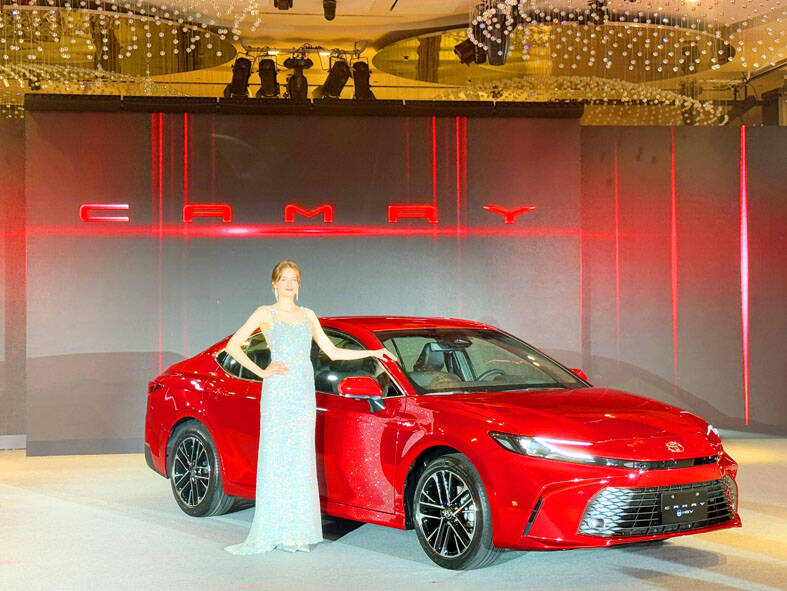Hotai Motor Co (和泰汽車), which distributes Lexus and Toyota vehicles in Taiwan, yesterday said it would back and comply with the government’s adoption of new curbs on cheaper auto components, mainly from China, to avert potential unfair competition.
The Industrial Development Administration last year expressed concern over the issue amid fears that it could affect the local market and lead to unfair competition, Hotai spokesman Lai Chih-wei (賴志偉) told investors at its earnings conference in Taipei.
“We were not surprised about the implementation of the new rules in August since the administration had long been talking with local automakers” about the issue, Lai said.

Photo: Amy Yang, Taipei Times
“Our stance is that we support and will fully comply with the regulations,” he said.
Hotai holds a 30 percent stake in Kuozui Motors Ltd (國瑞汽車), which assembles Toyota vehicles in Taiwan, with a majority of the auto parts sourced locally.
The government’s decision to tighten car assembly rules has sparked discussion about the legitimacy of the new regulations, although Hotai and China Motor Corp (中華汽車), which would suffer the brunt of the policy, have voiced their support.
The new regulations require automakers to increase the share of locally manufactured components in new vehicles, which must account for 15 percent of total car parts during the first year, 25 percent in the second year and 35 percent in the third year.
China Motor has to reschedule the launches of new electric vehicles from China’s GM Motor and SAIC Maxus Automotive Co (上汽大通汽車). China Motor assembles and sells GM cars in Taiwan, with up to 90 percent of the components imported from China.
Hotai yesterday retained its full-year business outlook, aiming to sell 170,000 vehicles, including Toyota, Lexus and Hino cars, this year, Lai said.
That means the company’s unit sales would hit an all-time high for a second straight year, following last year’s 166,000 units, he said.
Hotai has accumulated an order backlog of more than 10,000 vehicles due to strong demand, Lai said.
Hotai early this year set a goal to increase its domestic market share to 37.8 percent this year from 34.9 percent last year.
“We are expecting launches of new vehicles and revamped models to stimulate car sales and to grab more market share in the second half,” Lai said.
The company also maintained its forecast that new vehicle sales in Taiwan would reach 450,000 units this year, Lai said.
Hotai is cautious about vehicles sales next year, as the government’s tax incentives for new car purchases are to end at the end of next year, he said.
The company reported that net profit in the first half of the year contracted about 3 percent year-on-year to NT$11.76 billion (US$368.1 million), from NT$12.11 billion in the same period last year. Earnings per share dropped to NT$21.1 from NT$21.74.
The company attributed the decline to a higher base last year, as it was granted a higher quota of Lexus vehicles from Toyota Motor Corp after vehicle production returned to normalcy after the COVID-19 pandemic.

MULTIFACETED: A task force has analyzed possible scenarios and created responses to assist domestic industries in dealing with US tariffs, the economics minister said The Executive Yuan is tomorrow to announce countermeasures to US President Donald Trump’s planned reciprocal tariffs, although the details of the plan would not be made public until Monday next week, Minister of Economic Affairs J.W. Kuo (郭智輝) said yesterday. The Cabinet established an economic and trade task force in November last year to deal with US trade and tariff related issues, Kuo told reporters outside the legislature in Taipei. The task force has been analyzing and evaluating all kinds of scenarios to identify suitable responses and determine how best to assist domestic industries in managing the effects of Trump’s tariffs, he

TIGHT-LIPPED: UMC said it had no merger plans at the moment, after Nikkei Asia reported that the firm and GlobalFoundries were considering restarting merger talks United Microelectronics Corp (UMC, 聯電), the world’s No. 4 contract chipmaker, yesterday launched a new US$5 billion 12-inch chip factory in Singapore as part of its latest effort to diversify its manufacturing footprint amid growing geopolitical risks. The new factory, adjacent to UMC’s existing Singapore fab in the Pasir Res Wafer Fab Park, is scheduled to enter volume production next year, utilizing mature 22-nanometer and 28-nanometer process technologies, UMC said in a statement. The company plans to invest US$5 billion during the first phase of the new fab, which would have an installed capacity of 30,000 12-inch wafers per month, it said. The

Taiwan’s official purchasing managers’ index (PMI) last month rose 0.2 percentage points to 54.2, in a second consecutive month of expansion, thanks to front-loading demand intended to avoid potential US tariff hikes, the Chung-Hua Institution for Economic Research (CIER, 中華經濟研究院) said yesterday. While short-term demand appeared robust, uncertainties rose due to US President Donald Trump’s unpredictable trade policy, CIER president Lien Hsien-ming (連賢明) told a news conference in Taipei. Taiwan’s economy this year would be characterized by high-level fluctuations and the volatility would be wilder than most expect, Lien said Demand for electronics, particularly semiconductors, continues to benefit from US technology giants’ effort

‘SWASTICAR’: Tesla CEO Elon Musk’s close association with Donald Trump has prompted opponents to brand him a ‘Nazi’ and resulted in a dramatic drop in sales Demonstrators descended on Tesla Inc dealerships across the US, and in Europe and Canada on Saturday to protest company chief Elon Musk, who has amassed extraordinary power as a top adviser to US President Donald Trump. Waving signs with messages such as “Musk is stealing our money” and “Reclaim our country,” the protests largely took place peacefully following fiery episodes of vandalism on Tesla vehicles, dealerships and other facilities in recent weeks that US officials have denounced as terrorism. Hundreds rallied on Saturday outside the Tesla dealership in Manhattan. Some blasted Musk, the world’s richest man, while others demanded the shuttering of his